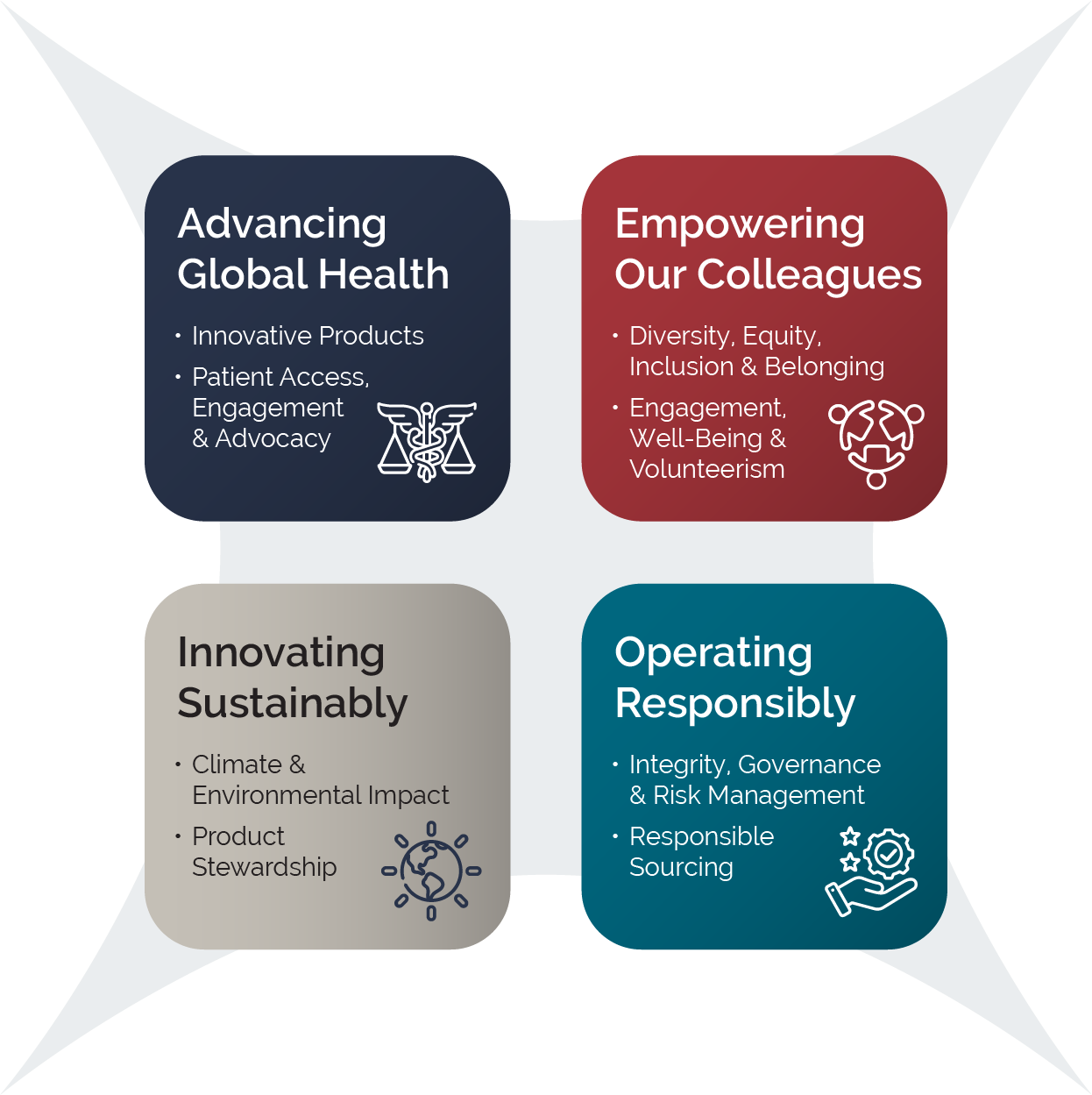Our ambition is to be a leading corporate citizen, acting with courage, creativity, and discipline to provide equitable benefit to our patients, business, and society. Our commitment to Responsible Business & Sustainability centers on four focus areas:
- Advancing Global Health – We will develop impactful medicines that will be accessible to far more patients around the world
- Empowering Our Colleagues – We will create inclusive and equitable opportunities for our people to thrive and make a lasting positive impact in the world
- Innovating Sustainably – We will take action to mitigate our impact on the environment and ensure business continuity
- Operating Responsibly – We will operate with integrity, transparency, and discipline to ensure we are meeting the diverse expectations of our stakeholders


“
All patients with cancer deserve access to high-quality, impactful medicines regardless of their location or socioeconomic status, but many wait years to access, or simply cannot afford, innovative treatment options. Our founding belief is that there is a better way to lower these barriers and broaden our reach and impact, which is why we’ve strategically built our company to bring our medicines to more people faster and in a more cost-efficient manner. Our commitment to innovation extends beyond our labs, and as a leading global oncology company with an ongoing mission to being a good corporate citizen, we know we must continue to do right not only by our patients, colleagues and stakeholders, but also the communities in which we operate.
”
–
John V. Oyler, Co-Founder, Chairman and CEO
Advancing Global Health
We believe that everyone should have access to innovative, life-changing medicines, regardless of their location. From the discovery of new therapies to scaling our commercial reach, we are committed to transforming the biotechnology industry, creating impactful medicines that will be accessible to far more cancer patients around the world.
In 2023, BeiGene laid the foundation to become a leader in global health equity. We developed a vision and mission for this commitment that reflects the voices and needs of at-risk patients, and defined what “global health equity” means to BeiGene as a company. To learn more, please visit our Advancing Global Health Equity page.
Upholding our value of Patients First, our Global Patient Safety team ensures the safe and effective use of our medicines from their first use in clinical trials to prescribed post-commercialization use. Our team rigorously surveilles patient outcomes, and effectively addresses safety issues that may arise. To learn more, please visit our Global Patient Safety page.
We remain committed to supporting patients, people, and communities through our science, expertise, resources, enthusiasm, and know-how to make a difference in the lives of the those who matter most. To learn more, please see our resources for Talk About It, our U.S. educational campaign focused on cancer and mental health, and the BeiGene Foundation, an independent 501(c)(3) nonprofit organization dedicated to eliminating barriers to equitable and accessible cancer care in underrepresented communities around the world.
Highlights
- 130+ clinical trials since 2013
- 70 countries with regulatory approvals
- Formalized our approach to global health equity
- Achieved progress in elevating patient insights in our drug development strategy
- Launched The BeiGene Foundation
Goals:
- Bring multiple high-quality new molecules from discovery into the clinic on an annual basis
- Continue to seek approvals for our medicines globally
- Spearhead multi-stakeholder solutions that empower patients and disrupt systemic access barriers by 2025
Empowering Our People
As a growing, innovative organization, our long-term success and ability to compete globally relies on cultivating an engaging and rewarding workplace – one that supports colleague well-being and offers ample opportunities for professional growth. We want our employees to feel empowered to contribute to our mission, not only helping our patients but also making a lasting positive impact on the world. We are committed to taking an active role in giving back to the communities in which we live and work.
Highlights
- Increased the percentage of women holding a position of VP or higher from 33% to 38%
- Hosted the first global Development Week
- Launched Be the Change, a global employee volunteer platform, and surpassed 20,000 hours of volunteerism
Goals:
- Maintain colleague engagement scores in 2024 vs 2022
- Reach global gender parity at the VP level and above by 2030
- Achieve a 50% improvement in workforce diversity of underrepresented groups at management levels in the US by 2030
- Continue to address Board diversity
- Engage employees in 10K volunteer hours by the end of 2024, stretch goal of 20K hours
Innovating Sustainably
At BeiGene, we recognize that human health and the health of the planet are intrinsically linked. Scientific studies show that higher levels of pollution correlate with higher incidences of disease, including some forms of cancer. Moreover, climate change impacts continue to grow in scale and intensity, increasing the risk of disruptions to our business and our ability to provide care to our patients. As a company focused on improving health and health equity, we believe it is imperative to operate our business in a way that mitigates our environmental impacts beginning with climate change.
Highlights
- Set first quantitative emissions reduction goal
- Laid the groundwork for a supplier engagement program, which launched in January 2024, to support setting a Scope 3 target by 2025
- Integrated climate change into our enterprise level risk management program
Goals
- Reduce Scope 1 and 2 emissions (emissions generated by owned and operated facilities) by 25% per unit of internally manufactured commercial product by 2026 from a 2021 base year
- Set quantitative Scope 3 emissions goal by 2025 by engaging with the most impactful of our raw supplier base
- Develop a product stewardship strategy
Operating Responsibly
At BeiGene, we are steadfast in our commitment to operating our business responsibly. Our values guide us in operating with integrity, transparency, and as a global corporate citizen. This includes strong governance of our Responsible Business & Sustainability issues, proactively engaging with key stakeholders, operating our business in an ethical manner, and sourcing from partners that share our commitment to social and environmental responsibility and risk management.
Highlights
- Launched a third-party risk management program
Goals:
- Develop a plan to better align key privacy performance metrics with RB&S practices by 2025
- Develop a strategy to align with the United Nations Global Compact’s guidance on human rights by 2025





